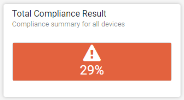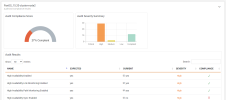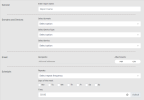On This Page
Device Audit Report
Overview
This report helps you maintain security and compliance across your network by enabling you to:
- Identify violations that require remediation.
- Ensure devices are regularly and consistently audited.
The report can be run on both live and offline devices. Live audits are supported for a limited number of vendors, while offline audits can be performed for any vendor using a device configuration file.
In addition, you can define custom compliance checks for offline devices to:
- Establish your own rules (e.g., password length, session timeouts).
- Audit devices from vendors not directly supported by Tufin.
- Monitor devices that cannot connect directly to SecureTrack.
This flexibility allows you to maintain and update compliance checks independently, without waiting for new SecureTrack (STRE) updates.
Supported Live Devices
The Device Audit report provides compliance testing for some firewalls managed by Palo Alto Panorama devices, Cisco IOS routers, Cisco ASA firewall devices, Check Point SmartCenter devices, or Fortinet Manager devices. Refer to your account team for the most updated list of supported devices.
The report determines how well the device configurations meet the vendor's CIS Benchmarks requirements (when available, or the vendor's best practices when not available).
What Can I See Here?
Report Information
The Report Information section includes details such as the report ID, name, time, domain, and devices selected during report creation.
Total Compliance Result
This section shows the average compliance summary for all devices.
Device Information
For each device, this section includes shows the Audit Compliance Score, Audit Severity Summary, and Audit Results. It shows how well the device configurations meet the vendor's CIS Benchmarks requirements (when available, or the vendor's best practices when not available)
Create a Device Audit Report
Prerequisites
-
In the Settings > General page, the administrator must configure the outgoing SMTP server and the remote repository.
-
Before running the Device Audit report, you must define device credentials.
-
There are ports that are required to run this report. For more information, See Central Cluster Ports.
Procedure
-
From the Create (
 ) menu, click Device Audit.
) menu, click Device Audit.The Setup page for the report appears.
-
Complete the common fields for all reports:
-
General: Report name.
-
Domains and Devices: Select a domain, device type, and devices. Only one device type can be selected per report.
-
Audit: Select CIS audit paragraphs, grouped by subcategory, for inclusion (for example, Password Policy > Minimum Password Length). These options vary depending on the selected device type. All audit options are selected by default.
You must define device credentials before running this report.
-
Export Report:
-
Email: Specify the recipients for notification emails. Press Tab or Enter to separate multiple email addresses.
The email message contains a link to the report in STRE. Reports can be generated as PDF or CSV files, and you can select either option or both (if enabled) to include in the email as an attachment. If the report file is larger than 4 MB, the attachment is compressed as a
.zipfile. -
Remote Repository: STRE can export reports using SFTP. Specify the report format - PDF or CSV.
If the report finished successfully, you can verify that the new files appear in the Reports Folder path, in the remote repository, configured by your administrator (see Send Reports Using SFTP).
-
- Schedule: Configure the following:
- Repeats: Select the frequency by which the report should run. Options include Daily, Weekly, and Monthly.
- Days of the week: Select one or more days on which the report should run.
- Time: Indicate the time at which the report should run.
When scheduling a report to run on a monthly basis, you must choose a single Day of the week value. For whichever weekday you choose (Mon, Tues, Wed, etc.) the report will run on the first of that day every month. Keep in mind, this may not correlate with the first calendar day of that month.
-
-
Click one of the following:
 : Saves the report. The Saved menu lists all saved and scheduled reports.
: Saves the report. The Saved menu lists all saved and scheduled reports. : Runs the report. After a report runs, you can view the results in the Repo menu.
: Runs the report. After a report runs, you can view the results in the Repo menu.
Available Report Formats
When viewing the report output, use the Export menu to save the report data.
You can save the data for this report as a CSV file or PDF output file.
-
The CSV export option is useful when you want to create your own reports based on the specific data from the report configuration.
-
When you select PDF, check the Export menu again for the PDF is ready status and click the link to view the PDF output.





